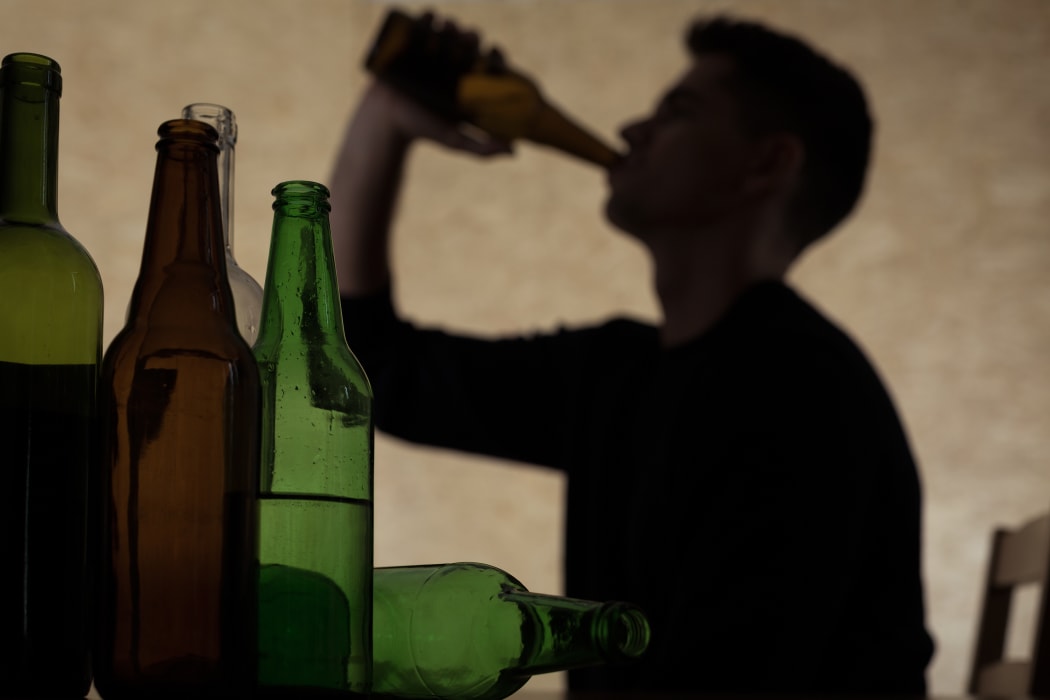The evidence is clear on the impact alcohol has on young brains, says researcher, educator and parenting expert Nathan Wallis – it’s very damaging.
He says the damage is done when young drinking starts before the age of 21.

Teen chugging a beer. Photo: 123RF
We’ve got a whole body of research that shows the damaging effects of alcohol to the teenage brain, we still see those effects into people's mid-40s - with some participants, you still see the effects for the rest of their life.”
Wallis says if we could “wave a magic wand” and have no one in our society drink alcohol until they were 21 “a 100 percent of our problems with alcohol will disappear”.
“When the 45 year old goes out and drinks a dozen cans and goes home and beats up his partner, people think that’s the result of the alcohol he’s had as a 45 year old, but from a research point of view, if he had not had alcohol until he was 21 a dozen cans wouldn’t have wiped out his frontal cortex, it wouldn’t have made him lose understanding of consequence. It‘s because he made it weak by exposing it to alcohol during adolescence.”
New Zealand’s binge-drinking culture make it difficult to set boundaries for children, he says.
“We've got a culture that celebrates alcohol poisoning.”
So how do you guide children onto a safer path? Treat them like they’re intelligent, he says.
“If you treat them like they are intelligent, and then they tend to act like they're intelligent. And that means that you include them in decision making, we know from the Dunedin study that the number one factor that determines your outcomes is really self-control.
“So, self-control is what we want them to do when it comes to alcohol, we want them to limit that amount of alcohol, so kids have to be raised being allowed to make decisions or making decisions with you.”
This collaborative approach should start early, Wallis says.
“That can be when your kid’s two saying ‘hey it’s snowing today wear your green jersey?’ Or are you the sort of parent that says ‘hey it’s snowing today would you like to wear your green jersey or your blue jersey?’
“So even though the kid’s two he’s already making decisions.”
That approach is a sound foundation for the teenage years, he says.
Discussing an appropriate amount of alcohol to take to a party should follow a similar pattern of negotiation, he says. The child might want to take more than the parent thinks is right but negotiating the amount down with the teenager involved in that process is the key.
“That part of the brain that makes good decisions, you want that to come online, you have to exercise it.”
Parental attitudes to alcohol have a big influence on a young mind, he says.
“I think one of the single biggest risk factors for whether a child grows up to have an issue with alcohol is if they've seen their parents abuse alcohol. Now unfortunately, that's not that uncommon in New Zealand culture, that just means having ever seen your parents drunk puts you in the risk group of having issues with alcohol.”
Wallis says abstinence from alcohol is probably not realistic, but delaying the moment a youngster has their first drink will have a positive life-long impact.
“I think the longer you can delay, the better because it's so bad for the developing brain, but you've got to be attuned with your child. You don't want them out doing it behind your back, because you've decided that that 18 is the age to start and they've decided 14 years.
“If they’re doing it behind your back they don't have any boundaries and there is no negotiation. So, I think it's just about having a relationship with your child.”
And do not validate risky behaviour to children, he says.
“Don't be giving them messages like it did me no harm because actually it probably did do you harm your hippocampus, your memory in your brain, is smaller the earlier you take on alcohol.
“The only people who’ve got a fully developed memory are the ones who know for sure they didn't have alcohol till 21.”
Related:

